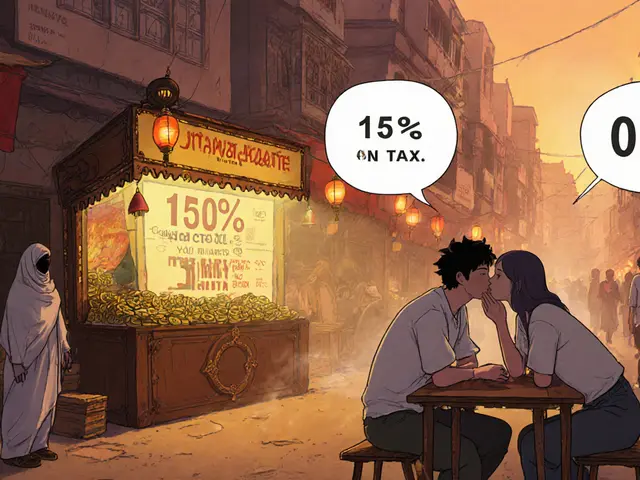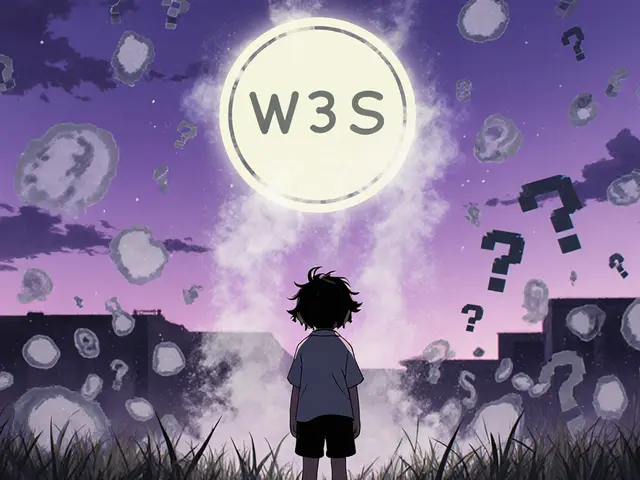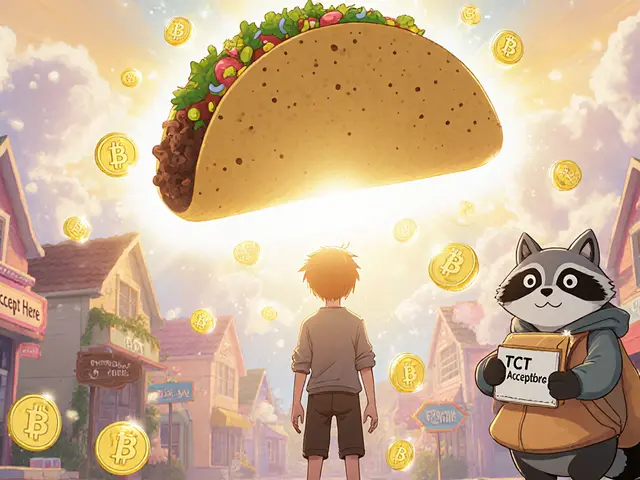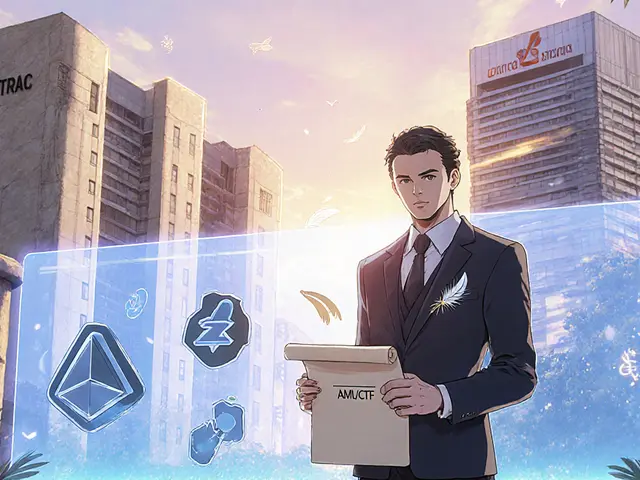Crypto Transaction Cost Calculator
Costa Rica Remittance Calculator
Compare traditional remittance costs with cryptocurrency transaction costs for sending money to Costa Rica. Based on real-world data from the article's discussion of how Costa Ricans use crypto.
Results
Enter an amount to see the cost comparison
Why This Matters in Costa Rica
As explained in the article, Costa Ricans use crypto for remittances because it's cheaper than Western Union and other traditional services. The article mentions that families send remittances to relatives in Nicaragua or El Salvador using Ripple's XRP, which is cheaper than Western Union and faster than bank transfers.
Costa Ricans don’t wait for permission to use crypto. There’s no official law saying they can’t, and that’s exactly how they’ve built a thriving digital currency culture - not because they’re breaking rules, but because there are no rules yet.
No Central Bank Approval Needed
The Central Bank of Costa Rica made it clear in 2024: Bitcoin, Ethereum, and other cryptocurrencies aren’t money. They’re not legal tender. They’re not foreign currency. They’re just digital assets. And that’s okay.That statement didn’t shut down crypto use - it freed it. Without the legal gray zone of "is this allowed?" Costa Ricans treated crypto like any other tool. If you can send money digitally, you can send Bitcoin. If you can buy something online, you can pay with USDT. No license. No paperwork. Just a wallet and a connection.
How People Actually Use It
You won’t find crypto ATMs on every corner, but you’ll find people using it every day.- Freelancers in San José get paid in Bitcoin or USDC from clients in the U.S. or Europe - no wire fees, no 5-day delays.
- Small shop owners in Tamarindo accept USDT for coffee, surfboard rentals, or yoga classes. Customers scan a QR code. The owner gets pesos in their bank account within minutes via a local exchange.
- Families send remittances to relatives in Nicaragua or El Salvador using Ripple’s XRP. It’s cheaper than Western Union and faster than bank transfers.
- Artists mint NFTs of their paintings and sell them on OpenSea. No government form. No tax declaration required - yet.
There’s no central registry for crypto wallets. No one asks for your ID to buy $500 worth of ETH. That’s not because people are hiding - it’s because no law says they have to show it.
The Business Side: Crypto Startups Thrive
Costa Rica has become a quiet hub for crypto startups. Why? Because it’s easy to start a company here.You register your business with the Registro Nacional. You get a tax ID. You open a bank account - and this is the hard part. Most banks still hesitate to work with crypto firms. But some do. And those that don’t? You use digital banks like N26 or Revolut, or partner with a fintech that already has a banking relationship.
Companies like CryptoCosta and BitPay Costa Rica operate legally by following general financial rules: they know their customers, they report suspicious activity, and they keep records. They don’t need a "crypto license" - they just follow anti-money laundering rules that already exist for money changers and payment processors.
Initial Coin Offerings (ICOs) are allowed too - as long as the tokens aren’t securities. A startup can raise funds by selling a utility token for access to a future app. No SEC-style registration. No prospectus. Just a whitepaper and a website.

Taxes? Still a Gray Area
The government hasn’t said whether crypto gains are taxable. So most people don’t report them.There’s no official guidance on capital gains, mining income, or staking rewards. The tax authority (Dirección General de Tributación) hasn’t issued a single ruling on crypto since 2018. That doesn’t mean it’s legal - it just means no one’s enforcing anything.
Some businesses, especially larger exchanges, voluntarily report income and pay corporate taxes. But individuals? Most treat crypto like cash. Buy low, sell high, spend the pesos. No one asks where the money came from.
What’s Changing in 2025
In July 2025, Costa Rica’s Legislative Assembly passed the first debate of Bill 22.837. This isn’t a ban. It’s a shift.The bill defines Virtual Asset Service Providers (VASPs) - that’s exchanges, wallet providers, and token issuers. It says they must register with SUGEF, the financial regulator. They’ll need to verify users, track transactions, and report risky activity.
But here’s the catch: registration isn’t approval. It’s compliance. You don’t get a license to operate. You just prove you’re not laundering money.
For everyday users, this won’t change much. You can still buy Bitcoin at a local kiosk. You can still send USDT to your cousin. But if you run a crypto exchange? You’ll need to upgrade your KYC system. You’ll need to log every transaction. You’ll need to prove you’re not helping criminals.

Why It Works - And Why It Might Not Last
Costa Rica’s crypto scene thrives because of what’s missing: red tape.Compare it to neighboring countries. In Panama, you need a special license. In Colombia, you need to report every transaction over $1,000. In Mexico, exchanges must be registered with the central bank.
Costa Rica didn’t say "yes" to crypto. It just didn’t say "no." That’s why people trust it. It’s not about rebellion. It’s about practicality. Crypto solves real problems: high fees, slow transfers, and unreliable banks. And until the government steps in, it works.
But the tide is turning. The proposed law is a sign that Costa Rica wants to be taken seriously by international financial institutions. It wants to avoid being blacklisted by the FATF. It wants to attract investment - but on its own terms.
For now, though, if you walk into a café in Heredia and pay with ETH, the barista won’t ask for your ID. She’ll just smile and say, "Gracias, en BTC."
What’s Next for Crypto in Costa Rica
The next 12 months will be critical. If the bill passes its second and third readings - expected by early 2026 - VASPs will have 180 days to comply. That means:- Exchanges will start requiring ID verification for all users.
- Wallet providers will need to log IP addresses and device fingerprints.
- Businesses that didn’t register will be forced to shut down or risk fines.
But individual users? They’ll still be able to hold, send, and spend crypto. The law targets service providers, not people. As long as you’re not running a business, you’re still in the clear.
Some Costa Ricans are already preparing. They’re moving funds to non-custodial wallets. They’re using peer-to-peer platforms like Paxful and LocalBitcoins. They’re avoiding centralized exchanges that might be forced to comply with new rules.
Others are betting on the future. They’re applying for VASP registration. They’re hiring compliance officers. They’re building systems that will work even after the law changes.
Final Thought: Freedom Isn’t Lawlessness
Costa Ricans aren’t using crypto because they’re dodging the system. They’re using it because the system never caught up.They’ve turned a legal vacuum into an opportunity - not by breaking rules, but by working around the absence of them. That’s not chaos. That’s innovation.
When the regulations finally arrive, they won’t kill crypto. They’ll just change how it’s used. And Costa Ricans? They’ve already learned how to adapt.
Is crypto legal in Costa Rica?
Yes, crypto is legal to hold, buy, sell, and use in Costa Rica. There are no laws banning it. But it’s not legal tender - meaning businesses don’t have to accept it, and the government doesn’t recognize it as money. People use it anyway because it’s fast, cheap, and works.
Do I need to pay taxes on crypto in Costa Rica?
There is no official tax rule for crypto gains in Costa Rica. The tax authority hasn’t issued guidance, so most individuals don’t report crypto income. Businesses that earn crypto revenue may pay corporate taxes, but there’s no clear requirement for individuals. That could change once new regulations are finalized in 2026.
Can I open a crypto exchange in Costa Rica?
Right now, you can operate a crypto exchange without a specific license, as long as you follow general financial rules like anti-money laundering (AML) and know-your-customer (KYC) requirements. But by 2026, new legislation will require all exchanges to register with SUGEF, the financial regulator. Without registration, you risk being shut down.
Are NFTs allowed in Costa Rica?
Yes, NFTs are fully legal. People mint and trade NFTs for digital art, music, and gaming items without any restrictions. Since NFTs are typically not classified as securities, they don’t require approval from financial regulators. Marketplaces like OpenSea and Blur are used regularly by Costa Rican creators.
Why don’t banks in Costa Rica support crypto businesses?
Many traditional banks are cautious because they fear regulatory risk. Even though crypto isn’t illegal, banks worry about being accused of enabling money laundering if they work with crypto firms. That’s why many crypto startups use digital banks like N26, Revolut, or partner with fintechs that already have banking relationships.
Will new regulations stop people from using crypto in Costa Rica?
No. The new rules target businesses - not individuals. Regular people will still be able to buy, hold, and send crypto. The changes will make exchanges and wallet providers more regulated, but they won’t make crypto illegal. In fact, the goal is to make Costa Rica’s crypto market more trustworthy for international partners.






Leo Lanham
November 7, 2025 AT 06:06 AMBro, Costa Rica is the last free zone left on Earth. No ID, no taxes, no BS. Just crypto and vibes. The rest of the world is still filling out forms while we're buying coffee with ETH. 🤌
Colin Byrne
November 8, 2025 AT 04:49 AMWhile it is undeniably true that the absence of regulation has permitted a decentralized financial ecosystem to flourish, one must consider the long-term implications of such a regulatory vacuum. The lack of formal oversight does not equate to legality; it merely signifies an enforcement gap. The impending legislation is not an infringement upon freedom, but rather a necessary evolution toward accountability in a globalized financial landscape.
Brian Webb
November 9, 2025 AT 14:23 PMI love how Costa Ricans just... use it. No fanfare, no drama. It’s not about rebellion - it’s about solving real problems. My cousin in San José pays his rent in USDT and gets pesos the same day. No bank delays, no fees. Simple. Smart.
Whitney Fleras
November 11, 2025 AT 03:00 AMThis is actually really inspiring. People finding ways to make things work without waiting for permission. It’s not lawless - it’s resourceful. Hope more countries learn from this instead of panicking and over-regulating.
Angie Martin-Schwarze
November 11, 2025 AT 07:50 AMi mean… i just dont trust any of this. like… what if the guy who took my usdt just… dissapears? 😭
Janna Preston
November 11, 2025 AT 15:01 PMWait, so if I move to Costa Rica, can I just mine Bitcoin and not pay taxes? That sounds too good to be true. Is there a catch?
Meagan Wristen
November 13, 2025 AT 05:56 AMI’ve been to Tamarindo last year and saw a surf shop take USDT. The owner didn’t even blink. He just scanned the QR, smiled, and handed me a cold coconut. That’s the kind of future I want to live in - simple, fast, human. 🌴
Becca Robins
November 14, 2025 AT 08:55 AMso like… no one’s checking if you’re laundering money?? 🤡 i mean… i get it but also… what if someone buys a yacht with stolen ETH??
Alexa Huffman
November 14, 2025 AT 09:05 AMThe beauty here isn’t just the lack of regulation - it’s the cultural trust. People use crypto because it works, not because they’re trying to evade the system. That’s innovation rooted in practicality, not rebellion. Costa Rica’s quietly setting an example.
Matthew Gonzalez
November 14, 2025 AT 11:00 AMIt’s not about whether crypto is legal. It’s about whether the system is broken enough to let something better grow in the cracks. Costa Ricans didn’t create a loophole - they noticed the system had no doors, so they just walked through. That’s not lawlessness. That’s evolution.
Grace Huegel
November 15, 2025 AT 10:17 AMI find it amusing that people call this "freedom" when it’s really just regulatory neglect. The moment the FATF comes knocking, Costa Rica will panic and turn into just another overregulated jurisdiction. This isn’t innovation - it’s waiting for the other shoe to drop.